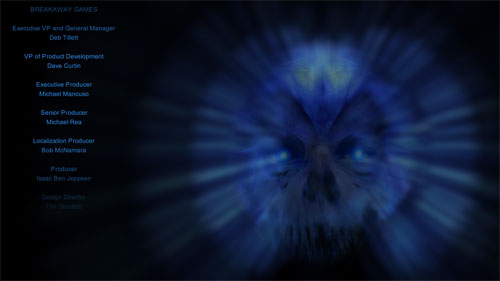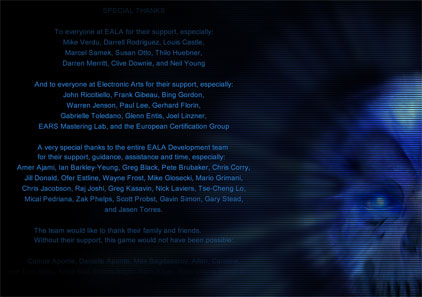By Blbpaws
July 19, 2008
When I was at EALA for the Red Alert 3 community summit, I was generally impressed with the developers I met on the team. Folks like Greg Kasavin, Greg Black, Mical Pedriana, Nick Laviers, Chris Corry, Andre Bremer, Jasen Torres, Amir Ajami and others seemed to genuinely be thinking about how to make Red Alert 3 a great game—that's wonderful to see. Many, myself included, have written that the single most important variable in determining Red Alert 3's success as a game will be its release date. If the team had, I thought, enough time and resources to do its job—the C&C 3 and Kane's Wrath teams did not, it seems—it would do it well.
For Red Alert 3, I still think this is true because I trust the guys working on it. My biggest concern with this game is merely its timing—rushing the release will doom it. Yet one can also hope that the new "live team"—run by Pete Larsen and dedicated to supporting the games—will improve aftermarket support, though that team is still being put together.
But is it fair to simply say that more time equals a better game all the time?
Certainly not giving a good team enough time will diminish a game's quality greatly. For example, C&C 3 suffered its many early bumps and bruises from a lack of proper time to finish development; EA essentially shipped a beta version. Yet I think much of the failure of Kane's Wrath, on the other hand, isn't solely attributable to rushing the release (though it certainly was rushed and poorly tested, there is no doubt). Kane's Wrath's flaws can be pinned, in addition, on the team behind it, a team that had little to do with C&C 3 (never mind the original C&Cs). To begin work on Red Alert 3 as soon as possible, EA essentially took a large number of people from C&C 3 and moved them to Red Alert 3, it appears. Worse, EA outsourced a great deal of the work on Kane's Wrath to a company on the other side of the country. The results speak for themselves.
First, consider this: of all the top developers mentioned above, none had any credited role in Kane’s Wrath other than "Special Thanks." The most influential architects of C&C 3 simply didn't work on the expansion. This decision is defendable to a point—I'm certainly not going to complain about having two quality C&C games at once—but the scale of it should be noted and its results (the "quality" part) should be considered. First, though, for the scale of the shift, see the chart below:
| Team Member |
Role in C&C 3 |
Role in Kane's Wrath |
| Scott Smith |
Lead Technical Designer |
none |
| Austin Ellis |
Lead Engineer |
none |
| Andre Bremer |
Technical Director |
none |
| Martin Hoffesommer |
Technical Director |
none |
| Sean O'Hara |
Technical Art Director |
Additional Art |
| Michael Jones |
Lead Visual Effects Artist |
none |
| Adam McCarthy |
Lead Animator |
none |
| Greg Black |
Lead Balance Designer |
Special Thanks |
| Jasen Torres |
Lead Campaign Designer |
Special Thanks |
| Mical Pedriana |
Audio Director |
Special Thanks |
| Amir Ajami |
Producer |
Special Thanks |
As I've said, putting people in roles where they can do the most good is certainly not a bad thing, so long as you get good people to take their old jobs. The results are the bottom line. This is where things look bad for Kane's Wrath. As they did with Battle for Middle Earth II: Rise of the Witch King and Command and Conquer: The First Decade, EA decided to outsource development of much of Kane's Wrath to another company, with poor results.

Breakaway Games credits, as appearing in Kane's Wrath
Their company of choice was BreakAway Games, based in Hunt Valley, Maryland (BreakAway had previously done the development of Rise of the Witch King). BreakAway did more than pitch in once in a while for Kane's Wrath; they had a large hand in developing the game. According to BreakAway, "BreakAway was contracted by Electronic Arts to develop Kane’s Wrath." Indeed, this is borne out in the credits of the game, as BreakAway is given its own section and extensive credit. For example, every position listed above (and many many more) was filled by at least one BreakAway person (sometimes working with an EA affiliate, often not). None of these fill-ins had ever worked on a C&C game before. None.
That's not to say there was no one connected to C&C on the team. Indeed, it appears a lot of the macrodesign was done by folks at EALA. A few EALA people, such as Sam Bass, moved up to take on larger roles than they had in C&C 3, mostly in things like storytelling. But on the whole, there's no doubt that BreakAway Games, a company that is also known for making simulations mostly (almost all of its media presence is with regards to simulations, not games for entertainment) and with no one affiliated with C&C, took on a huge role. This approach represented a radical shift from C&C 3's development.
Yet that alone isn't a disqualification. After all, there are lots of talented game developers who have never worked on C&C. Yet consider the results overall: after diverting its main RTS team to a new RTS game, EA found a new set of developers for the expansion to C&C 3. The expansion shipped riddled with bugs. Is it a coincidence that after EA dropped five of its top technical people from the team (see chart above), Kane's Wrath suffered as many technical problems as it did? Is it surprising that after losing its Lead Balance Designer, Kane's Wrath has balance problems? Is it any wonder that, after branching the code in mid-2006 (based on the copyright date left in the expansion's World Builder), Kane's Wrath shipped without many of the improvements that were added to Tiberium Wars through patches? Or that it has an outdated World Builder and no Mod SDK?
Now, some of the outsourcing has worked. For example, while much of the art and art direction was outsourced, the art in Kane's Wrath is pretty good. So, while it's not all bad, the outsourcing strategy needs to be reconsidered very carefully. There's not enough data to go on for this point, but perhaps some aspects of game development (most likely art) lend themselves to be farmed out easily, while other parts simply do not. On the whole, though, when evaluating the results of the outsourcing strategy in Kane's Wrath, I'd say it's failed. Requests to EA for comments about the team involved with Kane's Wrath and the Kane's Wrath patch were ignored. I urge C&C fans to demand an answer to this important question.
It's interesting to note, however, that this isn't exactly the first time this has been tried—and it isn't the first time it hasn't worked, either. EA tried it with The First Decade (developed primarily by Barking Lizards Technologies), yet that compilation was also riddled with bugs and errors (which weren't patched well in the least). Although I'm not a Lord of The Rings fan, EA outsourced much of BFME II's expansion as well.
Think there's no effect on the end result? The big-picture results of outsourcing can be seen below. Pay attention to the MetaCritic scores of each outsourced game, in particular.
| Game |
In-House? |
MetaCritic Score |
GameSpot Score* |
IGN Score* |
| Command and Conquer: Generals |
Yes |
84 |
89 |
93 |
| Command and Conquer: Generals: Zero Hour |
Yes |
83 |
86 |
90 |
| The First Decade |
Outsourced |
71 |
76 |
- |
| Battle for Middle Earth II |
Yes |
84 |
83 |
90 |
| Battle for Middle Earth II: Rise of the Witch King |
Outsourced |
78 |
73 |
80 |
| Command and Conquer 3 |
Yes |
85 |
90 |
85 |
| Command and Conquer 3: Kane's Wrath |
Outsourced |
77 |
75 |
79 |
* Scores adjusted to a 100 point scale for ease of comparison.
 Special Thanks
Special Thanks section in the Kane's Wrath Credits, in which Breakaway Games thanks much of the original C&C 3 development team at EALA for assistance.
Looking in general across the board, RTS games that are outsourced by EA generally score in the 70s—that's 6 to 7 points lower than their counterparts developed at EALA. Looking in specific at two of the biggest game review sites, GameSpot and IGN, we can see that the effect still exists, with the average drop-off between an in-house game and its outsourced expansion almost nine points. Nor are these rankings easily dismissed. In a meeting with Wall Street analysts in February, Electronic Arts CEO John Riccitiello is quoted as saying, "our core game titles are accurately measured and summarized by these assessments [metacritic scores], and that is a very big deal." Obviously, the head decision makers at Electronic Arts find there to be some legitimacy to these scores.
Learning from mistakes is key. Let us hope that Kane's Wrath is the last time EA makes this mistake. There will be at least one expansion to Red Alert 3 and it will inevitably be tempting for EA to ship a good part of the art and coding off to another company. Yet EA is a bottom-line business (as all should be) and the results of shipping out development as EA has done in the past are pretty clear. I have no doubt that when the Red Alert 3 expansion comes around, fans will look at it more critically, given the relative failures of Rise of the Witch King and Kane's Wrath, the two outsourced expansion packs that EA has shipped.
EA could stunt much of this criticism by openly admitting that they previously approached expansion pack development poorly, and that they'll be happy to prove the effectiveness of their changes to us. They've already made this commitment with the new support team. Why not with the teams that develop the games? Do it right and fans will come. As always, the results speak for themselves.
Mike contributed additional reporting for this article.